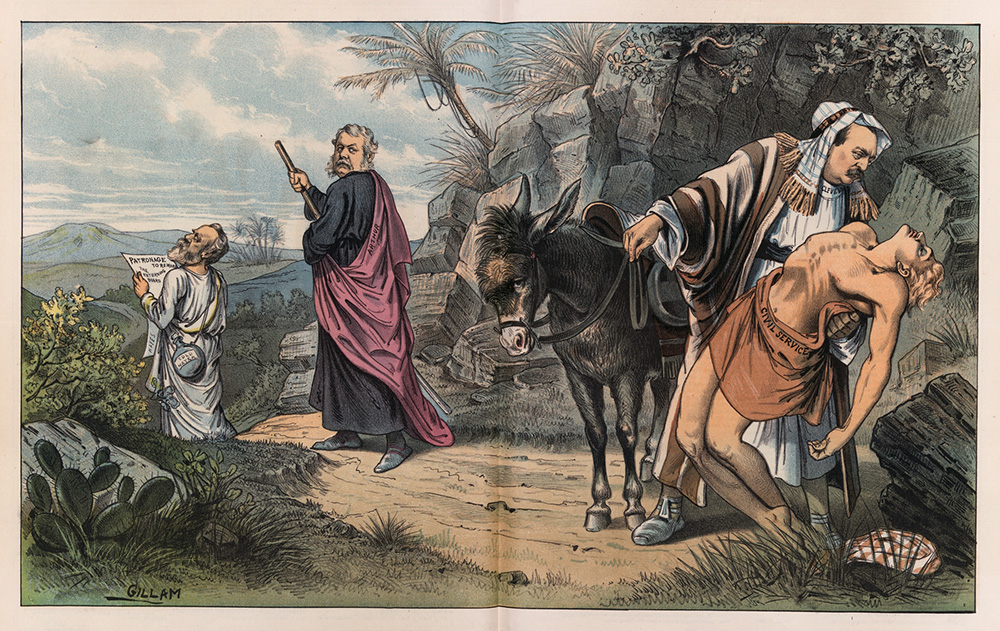
(Unsplash/Logan Weaver)
Listening to the Gospel story of the Good Samaritan, I was struck by the translation's repetitive phrase that people, on seeing the person in need of help, "crossed the street."
I began to reflect on what is happening in our country and what we are hearing that creates fear or indifference in us, so much so that we are "crossing the street" to avoid extending compassion and care to those in need.
Perhaps the Gospel story today would go something like this.
A family, having escaped persecution in their home country, has made the difficult journey to the U.S. On their way, "coyotes" robbed them, and they found themselves in great need when they crossed the border. They were able to find work and a place to live, but now are threatened with being deported. They live in fear as ICE agents roam the neighborhood, looking for those who don't belong. But today, the husband has to go out, and within minutes ICE agents surround him.
A middle-aged man, seeing the unmarked car with masked men going toward the man, "crossed the street." He had heard so much from the president that the U.S. is being invaded by those who want to take over our country and who are basically thugs, that he didn't see any reason to step in and help. And if he thought he might do something, the fear that he would be arrested or put on a list was enough for him to just keep walking.
Advertisement
In another part of town, a young person struggling with who s/he is seeks guidance at a LGBTQAI+ center. Before getting into the center, s/he is beaten and left half dead on the sidewalk.
A couple walked by, and when they saw this young person, they "crossed the street." Being Christian, they feel that people are either male or female. Whatever is happening today with people thinking in such immoral ways must be part of the secular culture that has taken over our country. This person probably got what s/he deserved, and they certainly didn't need to do anything about it. Why get involved?
The local newspaper runs a story about a grandmother living with AIDS in a rural area of Uganda, waiting anxiously for antiretroviral drugs to be delivered, as she had heard about the severe cuts the U.S. President made to the PEPFAR (President's Emergency Plan for AIDS Relief) program. Although the local AIDS workers did arrive, she will not receive her antiretroviral drugs if the cuts are confirmed. It is estimated that if this highly successful program is not continued, it could lead to 1 million more children contracting HIV by 2030, with nearly 500,000 deaths from AIDS-related causes. People were urged to call their members of Congress and demand that these cuts be restored.
A young woman was reading this story and, in her way, she "crossed the street" as she quickly turned the page. She didn't think this was true. The president has said he is only going after waste, fraud and abuse. This kind of story is simply biased against what he wants. And anyway, what kind of life are they living if they have AIDS? Let their country take care of their own. We don't need to help them.

"The good samaritan" (1885) by Bernhard Gillam (Artvee)
In the Gospel parable, finally, someone stops to help the person. It was not his job, or vocation, or status in life that made him stop but simple decency, care, compassion and respect for each person. This person was willing to give of his time and his resources to help.
There are so many more examples of our neighbors — each other and our Earth — being in need right now, and too many of us "crossing the street" to avoid getting involved. We read and hear so much that causes fear of the other; explanations which may contain some truth but are distorted for political gain; decisions that are cruel, revengeful, lacking compassion and eroding democracy.
In rewriting this parable, I began to realize the assumptions and fears that operate in me regarding the many things that are going on in our country at this time. Why am I
crossing the street to avoid helping, addressing, making the Gospel mandate to love my neighbor as myself come to life?
I know I need to continue to open myself in contemplation, to be in touch with what is going on and what either keeps me from or moves me to respond in ways that reflect the Gospel values of compassion, care, respect, justice, mercy and love.
I invite all of us to enter the contemplative space for a while and see what emerges as to why you cross the street and when you respond out of love.
Then finish the ending of this parable. Who is the Good Samaritan today? How would s/he respond?
Author's note: You can send your reflection to [email protected]. Please put in the subject line "Good Samaritan." In sending your response, you are also giving permission to have it considered for publication. We will collect responses until Aug. 15.






